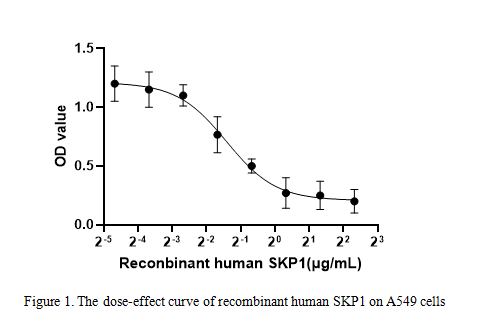Active S-Phase Kinase Associated Protein 1 (SKP1) 

SKP1A; EMC19; OCP-II; OCP2; TCEB1L; p19A; Cyclin-A/CDK2-associated p19; RNA polymerase II elongation factor-like protein; Transcription elongation factor B polypeptide 1-like
- UOM
- FOB US$ 251.00 US$ 628.00 US$ 1,256.00 US$ 3,768.00 US$ 9,420.00
- Quantity
Overview
Properties
- Product No.APF883Hu01
- Organism SpeciesHomo sapiens (Human) Same name, Different species.
- ApplicationsCell culture; Activity Assays.
Research use only - DownloadInstruction Manual
- CategoryEnzyme & Kinase
- Buffer FormulationPBS, pH7.4, containing 0.01% SKL, 5% Trehalose.
- Traits Freeze-dried powder, Purity > 90%
- Isoelectric Point4.4
Sign into your account
Share a new citation as an author
Upload your experimental result
Review

Contact us
Please fill in the blank.
Activity test

S-Phase Kinase Associated Protein 1 (SKP1) is a core component of the SKP1-Cullin-F-box (SCF) E3 ubiquitin ligase complex. It is an adaptor protein, connecting cullin and F-box proteins in the complex. SKP1 mediates the ubiquitination of proteins involved in cell cycle progression, signal transduction and transcription. Previous studies have shown that SKP1 protein is associated with Mitochondrial Dna Depletion Syndrome 13 and Parkinson. To test the effect of SKP1 on cell proliferation, A549 cells were seeded into triplicate wells of 96-well plates and allowed to attach, replaced with various concentrations of recombinant human SKP1. After incubated for 72h, cells were observed by inverted microscope and cell proliferation was measured by Cell Counting Kit-8 (CCK-8). Briefly, 10 µl of CCK-8 solution was added to each well of the plate, then the absorbance at 450 nm was measured using a microplate reader after incubating the plate for 1-4 hours at 37 ℃. Cell viability was assessed by CCK-8 assay after incubation with recombinant human SKP1 for 72h. The result was shown in Figure 1. It was obvious that SKP1 significantly decreased cell viability of A549 cells. The ED50 of recombinant human SKP1 is 0.375 μg/ml.
Usage
Reconstitute in 10mM PBS (pH7.4) to a concentration of 0.1-1.0 mg/mL. Do not vortex.
Storage
Avoid repeated freeze/thaw cycles. Store at 2-8°C for one month. Aliquot and store at -80°C for 12 months.
Stability
The thermal stability is described by the loss rate. The loss rate was determined by accelerated thermal degradation test, that is, incubate the protein at 37°C for 48h, and no obvious degradation and precipitation were observed. The loss rate is less than 5% within the expiration date under appropriate storage condition.
Increment services
-
 BCA Protein Quantification Kit
BCA Protein Quantification Kit
-
 Molecular Mass Marker for Protein
Molecular Mass Marker for Protein
-
 Monoclonal Antibody Customized Service
Monoclonal Antibody Customized Service
-
 Polyclonal Antibody Customized Service
Polyclonal Antibody Customized Service
-
 Protein Activity Test Experiment Service
Protein Activity Test Experiment Service
-
 Electrophoretic Mobility Shift Assay (EMSA) Experiment Service
Electrophoretic Mobility Shift Assay (EMSA) Experiment Service
-
 Buffer
Buffer
-
 Lentivirus Packaging Experiment Service
Lentivirus Packaging Experiment Service
-
 Adenovirus Packaging Experiment Service
Adenovirus Packaging Experiment Service
-
 Real Time PCR Experimental Service
Real Time PCR Experimental Service
-
 Spike RBD Protein (S-RBD)
Spike RBD Protein (S-RBD)
-
 Protein G
Protein G
-
 Protein A
Protein A







